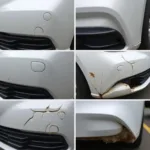You’re in a tricky situation: somebody has your car keys and won’t give them back. Maybe it’s a friend, a family member, or even a mechanic. You just want your car back. Your first thought might be to “repo” it, like you’ve seen on TV. But can you legally repossess your own car? The answer is complex and depends on several factors. Let’s break it down.
Understanding Your Rights and Options
Before you even think about repossessing your car, it’s crucial to understand your legal standing.
- Is it theft? If someone took your car keys without your permission and with the intent to permanently deprive you of your vehicle, that’s considered theft. You need to report it to the police immediately.
- Is there a contractual agreement? Did you lend the car to someone with a written agreement specifying the return date and conditions? This could work in your favor if legal action becomes necessary.
- What does your state law say? Laws regarding vehicle repossession vary significantly from state to state. Some states might allow you to repossess the vehicle yourself under certain circumstances, while others require you to involve law enforcement or go through the courts.
 Car keys dispute
Car keys dispute
Can You Repossess Your Own Car?
The short answer is: it’s complicated. While it’s technically your property, taking the law into your own hands can have serious consequences. Here’s why you should think twice before attempting to repossess your own car:
- Risk of legal trouble: You could face accusations of theft, trespassing, or even assault if you try to take the car without proper legal procedures.
- Potential for violence: The situation could escalate quickly if the person with your car keys refuses to cooperate. This puts you and others at risk.
- Damage to your vehicle: You could be held liable for any damage caused during a self-help repossession attempt.
The Right Way to Get Your Car Back
Instead of risking legal trouble and potential danger, here’s the safest approach:
- Communicate: Try to resolve the issue peacefully. Talk to the person who has your keys and explain the situation calmly. They may be willing to return the car without further complications.
- Send a demand letter: If communication fails, send a formal demand letter through certified mail. This establishes a paper trail and shows that you’re serious about getting your property back.
- Contact the police: If you believe your car was stolen or the person with your keys is refusing to return it, file a police report. This creates an official record of the incident and can be helpful in court.
- Seek legal advice: Consult with an attorney who specializes in auto law or property disputes. They can advise you on the best course of action based on your specific circumstances and state laws.
Conclusion
Recovering your car from someone who won’t return your keys can be frustrating and stressful. While the desire to take matters into your own hands is understandable, it’s crucial to prioritize safety and legal compliance. Remember, attempting to repossess your own car can lead to serious legal ramifications. Instead, focus on communication, documentation, and seeking professional legal counsel to ensure the safe and legal return of your vehicle.


